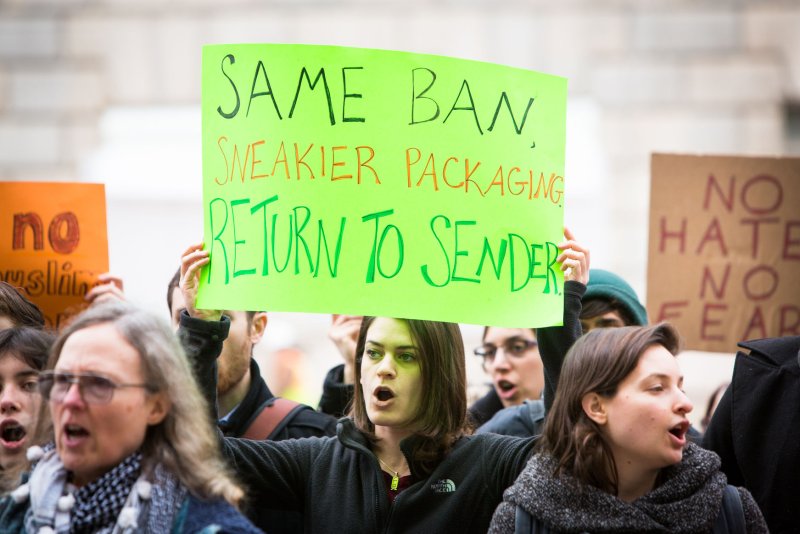People protest against President Donald Trump's new travel ban outside the U.S. Customs and Border Protection office in Washington, D.C., on March 7. An appeals court upheld a circuit court order halting the revised travel ban and on Thursday night the Justice Department appealed the ruling to the U.S. Supreme Court. Photo by Erin Schaff/UPI |
License Photo
June 1 (UPI) -- The Justice Department on Thursday night asked the U.S. Supreme Court to immediately reinstate President Donald Trump's executive order banning travel from six Muslim-majority countries.
In a filing, the nine justices were asked to consider the executive order's legality in an appeal of a ruling by the 4th Circuit blocking the ban. The justices include Neil Gorsuch, Trump's nominee who was confirmed by the Senate in April.
The Trump administration wants them to hear arguments on an expedited basis and to reinstate the executive order in the interim.
"We have asked the Supreme Court to hear this important case and are confident that President Trump's executive order is well within his lawful authority to keep the Nation safe and protect our communities from terrorism," said Justice Department spokesperson Sarah Isgur Flores.
"The president is not required to admit people from countries that sponsor or shelter terrorism, until he determines that they can be properly vetted and do not pose a security risk to the United States."
The lower court's May 25 ruling had said the policy was "steeped in animus and directed at a single religious group."
Trump's executive order barred entry into the United States for 90 days for residents of Iran, Libya, Somalia, Sudan, Syria and Yemen.
The Virginia-based federal appeals court voted 10-3 to uphold the nationwide halt to the policy on appeal from a circuit court judge, saying the travel ban was driven by unconstitutional religious motivations.
The majority noted Trump's campaign pledge to bar Muslims from entering the country. The court also faulted the White House for rushing out the first version of the executive order without consulting with the national security agencies and causing confusion at airports in the United States.
The executive order "speaks with vague words of national security, but in context drips with religious intolerance, animus and discrimination," Circuit Judge Roger Gregory wrote.
The original ban also included Iraq and would have given Christians in affected countries the first chance to apply for visas and refugee status. The new order, signed on March 6, added language exempting existing green card and visa holders.
Thirteen state attorneys general filed an amicus brief in support of the travel ban, saying the block on the order prevents Trump from his constitutional ability to make national security decisions.
"The district court's ruling is thus an intrusion into the national-security, foreign affairs, and immigration powers possessed by the Executive and delegated by Congress. ... It threatens amici's interests by denying the federal government -- under a statutory regime crafted by the States' elected representatives in Congress -- the latitude necessary to make policy judgments inherent in this country's nature as a sovereign," the brief reads.
The first ban on Jan. 27 signed by Tump was ruled unconstitutional by a circuit court judge in Seattle and 9th Circuit Court of Appeals in San Francisco.
A circuit judge in Hawaii also ruled against the revised order.















